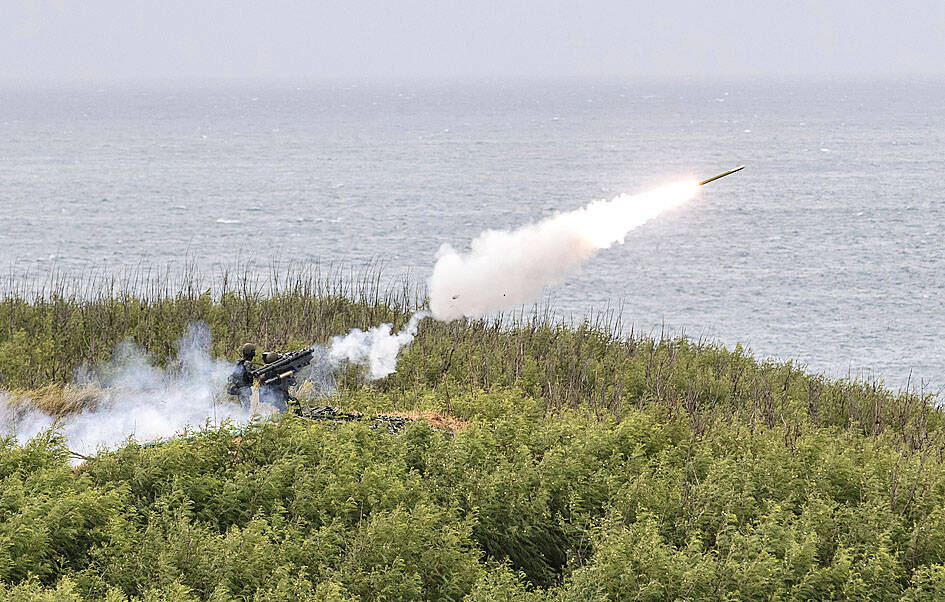The Ministry of National Defense (MND) plans to seek up to a record US$33 billion in special funding to upgrade the nation’s defenses against a potential Chinese attack, a senior lawmaker told AFP.
As Beijing ramps up its military pressure, Taiwan over the past few recent years has responded by boosting its defense spending, but Washington, Taipei’s biggest arms supplier, has been pushing it to do more.
The ministry is working on a special budget of between NT$800 billion and NT$1 trillion (US$26.4 billion and US$33.1 billion) over seven years, Democratic Progressive Party (DPP) Legislator Wang Ting-yu (王定宇) said.

Photo: AP
The final amount has not been finalized, as Taiwan is negotiating with the US over potential arms sales that would be included in the special budget, Wang said.
“We want to build a complete defense ecology to defend our country,” Wang said, describing the plans as a “huge” upgrade to the nation’s self-defense capabilities.
Wang said the plans included integrating Taiwan’s air defense systems; acquiring from overseas partners more advanced technology to detect small drones, rockets and missiles, and ensure a rapid response to an attack; and increasing the nation’s capacity to produce and store ammunition for wartime.
“China is developing their fifth-generation fighters and they’re using stealth technology in all kinds of drones or missiles,” said Wang, who sits on the legislature’s Foreign Affairs and National Defence Committee. “So we need more advanced sensor systems, more advanced radar systems — if you cannot detect it, all kinds of fire units are useless.”
Wang’s remarks came as Taiwan seeks to strike a deal with the US to reduce US President Donald Trump’s 20 percent tariff on the nation’s shipments.
Last month, President William Lai’s (賴清德) government announced plans to increase next year’s defense budget to NT$949.5 billion, or more than 3 percent of GDP. It aims to increase spending to 5 percent of GDP by 2030.
Asked if he hoped the special defense budget plans would help Taiwan in the trade negotiations, Wang replied: “Yes.”
If the Cabinet approves the spending plan, it would have to be passed by the opposition-controlled legislature before it can take effect. Wang said he hoped the opposition parties would support the special budget proposal because it was for “our survival.”
Chinese Nationalist Party (KMT) Legislator Huang Jen (黃仁), cochair of the Foreign Affairs and National Defense Committee, said if the budget were submitted to the legislature, the party’s caucus would “definitely discuss it before making a decision.”
“We understand the enemy threat and pressure from the US, but given limited resources, the key is how to spend money effectively,” Huang said.
Su Tzu-yun (蘇紫雲), a research fellow at the state-run Institute for National Defense and Security Research, said Taiwan urgently needed to strengthen its air defenses.
“Beyond the threat of drones, China currently patrols the waters around Taiwan with about eight warships, each carrying roughly 60 vertical launch system cells,” Su said. “These vessels could launch 500-plus cruise missiles, conduct surprise attacks and reach Taiwan’s critical military facilities in approximately three minutes, creating a new missile crisis.”

Right-wing political scientist Laura Fernandez on Sunday won Costa Rica’s presidential election by a landslide, after promising to crack down on rising violence linked to the cocaine trade. Fernandez’s nearest rival, economist Alvaro Ramos, conceded defeat as results showed the ruling party far exceeding the threshold of 40 percent needed to avoid a runoff. With 94 percent of polling stations counted, the political heir of outgoing Costa Rican President Rodrigo Chaves had captured 48.3 percent of the vote compared with Ramos’ 33.4 percent, the Supreme Electoral Tribunal said. As soon as the first results were announced, members of Fernandez’s Sovereign People’s Party

MORE RESPONSIBILITY: Draftees would be expected to fight alongside professional soldiers, likely requiring the transformation of some training brigades into combat units The armed forces are to start incorporating new conscripts into combined arms brigades this year to enhance combat readiness, the Executive Yuan’s latest policy report said. The new policy would affect Taiwanese men entering the military for their compulsory service, which was extended to one year under reforms by then-president Tsai Ing-wen (蔡英文) in 2022. The conscripts would be trained to operate machine guns, uncrewed aerial vehicles, anti-tank guided missile launchers and Stinger air defense systems, the report said, adding that the basic training would be lengthened to eight weeks. After basic training, conscripts would be sorted into infantry battalions that would take

GROWING AMBITIONS: The scale and tempo of the operations show that the Strait has become the core theater for China to expand its security interests, the report said Chinese military aircraft incursions around Taiwan have surged nearly 15-fold over the past five years, according to a report released yesterday by the Democratic Progressive Party’s (DPP) Department of China Affairs. Sorties in the Taiwan Strait were previously irregular, totaling 380 in 2020, but have since evolved into routine operations, the report showed. “This demonstrates that the Taiwan Strait has become both the starting point and testing ground for Beijing’s expansionist ambitions,” it said. Driven by military expansionism, China is systematically pursuing actions aimed at altering the regional “status quo,” the department said, adding that Taiwan represents the most critical link in China’s

EMERGING FIELDS: The Chinese president said that the two countries would explore cooperation in green technology, the digital economy and artificial intelligence Chinese President Xi Jinping (習近平) yesterday called for an “equal and orderly multipolar world” in the face of “unilateral bullying,” in an apparent jab at the US. Xi was speaking during talks in Beijing with Uruguayan President Yamandu Orsi, the first South American leader to visit China since US special forces captured then-Venezuelan president Nicolas Maduro last month — an operation that Beijing condemned as a violation of sovereignty. Orsi follows a slew of leaders to have visited China seeking to boost ties with the world’s second-largest economy to hedge against US President Donald Trump’s increasingly unpredictable administration. “The international situation is fraught